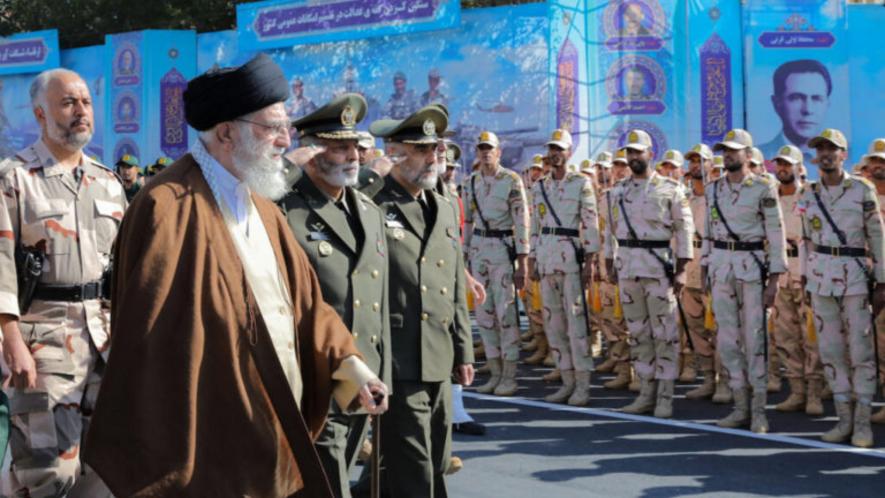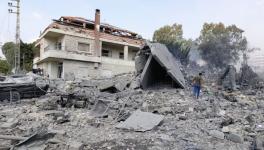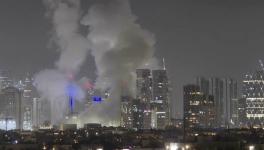Iran Warns Israel Against its Apocalyptic War

Iran’s Supreme Leader Ayatollah Ali Khamenei at the graduation ceremony of the country’s military academies, Oct. 10, 2023
Amidst growing speculations in the US about Tehran’s involvement in the Hamas’ attack on Israel last Saturday and the reported move by the Pentagon to despatch by the weekend a second aircraft carrier to the East Mediterranean, Iran’s Supreme Leader Ayatollah Ali Khamenei has spoken for the first time on the explosive situation.
Khamenei spoke in Tehran on Tuesday in his capacity as the Commander-in-Chief of Iran’s Armed Forces choosing the occasion of the annual joint graduation ceremony for the cadets of Iran’s military academies to dwell on the topic.
In an unprecedented move, excerpts of Khamenei’s remarks have since been relayed in Hebrew to the Israeli audience.
Khamenei’s statement warns Israel against any rash moves that it may come to repent later. Khamenei anticipated Israel’s “irreparable defeat.” He said “the killing Palestinian men, women, children, and elderly, desecrating the al-Aqsa Mosque, beating worshipers, and letting loose armed settlers to attack the Palestinian people are among the atrocities committed by the Zionist regime.”
Khemenei made three key points in his speech:
- First, Israel is on the wrong path by embarking on such a war against Gaza. “The rulers and decision-makers of the Zionist regime and their supporters should know that these actions will bring a greater disaster upon them, and the Palestinian people, with a firmer determination, will slap their hideous faces harder in response to these crimes.”
- Second, the rumour “spread by the elements of the Zionist regime and its supporters” about the involvement of “non-Palestinians (read Hezbollah) including Iran” in the recent events is “nonsense.”
- Three, most important, Khamenei prefaced his remarks by describing Iran’s armed forces as “the steel fortress of security, honour and national identity.” He recalled Iranian armed forces’ brilliant record in the eight-year war with Iraq, which was also a world war, and later, in thwarting the US’s “wicked plot” to create ISIS and destabilise the region, Iran being the ultimate target.
Khamenei was all but explicit that Iran’s armed forces are in a state of readiness and have the capability to defend the country if push comes to shove. That said, he also made a nuanced remark that “The entire Islamic world is obliged to support the Palestinian nation.”
The bottom line is, in Khamenei’s words, “From the military and intelligence aspects, this defeat (of Israel) is irreparable. It is a devastating earthquake. It is unlikely that the usurping regime will be able to use the help of the West to repair the deep impacts that this incident has left on its ruling structures.”
Indeed, Israel faces a serious existential crisis due to the disunity within and the irrelevance of its military prowess to meet the challenges of the hybrid war it is experiencing. Iran, therefore, sees that the advantage lies with the axis of resistance.
Interestingly, Egypt has disclosed that it had warned Israel about an impending large-scale attack by Hamas but the latter failed to act on it. To be sure, there is going to be stocktaking within Israel at some point. Prime Minister Netanyahu will be hard-pressed to explain. On the other hand, typically, he will try to cover up and whip up xenophobia with war cries to distract attention.
In the big picture, it is inconceivable that given the catastrophic consequences, the US will dare to attack Iran. But the temptation will be there to roll back the Hezbollah in neighbouring Lebanon using the present opportunity and, second, seriously destabilise the Syrian situation while Russia remains preoccupied in Ukraine — that is to say, make a desperate attempt to undo the gains of the so-called Axis of Resistance led by Iran through the past decade and more. Therefore, there is no question that this remains a potential flashpoint as far as Iran is concerned, and Tehran will remain vigilant about not losing ground in the Levant.
The heart of the matter is that the US and Israel are confronting today a vastly different Iran than they have been used to through the past four decades and more since the 1979 Islamic Revolution. Consider the following:
- Iran is no more in isolation and it has successfully overcome the Western sanctions;
- BRICS membership is a game changer for Iran’s integration into the global community.
- Iran is a threshold state in its nuclear weapon programme, enjoying strong relationships with Russia and China and can even tilt the balance in the co-relation of forces in West Asia and neighbouring regions and even internationally.
- Iran is no longer entrapped in a debilitating regional rivalry with Saudi Arabia and the easing of the conflict situations in Yemen and Syria creates space for Tehran to manoeuvre on the diplomatic arena. (Iran’s foreign minister is actively coordinating with his counterparts in the region.)
All of this enables Iran to move to the next phase of development and advance its global presence and expand its influence. Suffice to say, Iran is steadily outstripping Israel in the power dynamic of the region. Being a much smaller country with an uncertain future which is called upon to adjust to the new reality of US retrenchment, Israel is no longer in the same league as Iran. The Hamas operation exposes this geopolitical reality.
A protracted war in Gaza will be a colossal drain on Israel’s resources and can only weaken the country. Its outcome remains anybody’s guess. But on the other hand, Israel believes that it has no diplomatic options, either. On top of it, if Hezbollah enters the fray, all that happened last Saturday in Israel will seem like a picnic. With its massive stockpile of advanced missiles — close to 200,000 rockets trained on virtually every nook and corner of Israel — Hezbollah has the capability to destroy Israel comprehensively.
Principally, the deployment of two US aircraft carriers in Eastern Mediterranean is intended to send a strong message to Hezbollah. On the other hand, it also highlights that in addition to Ukraine and Taiwan, the West Asian theatre will continue to engage the US for a foreseeable future. If this is not imperial overstretch, what is it? Something has to give way.
These are early days. Meanwhile, the EU’s united front on Israel’s war with Hamas is already showing its first cracks. On Monday, within hours of the announcement that the EU would put €691 million in aid to the Palestinian Authority under review, with all payments immediately suspended, foreign policy chief Josep Borrell stepped in to retract, saying the Commission “will not suspend the due payments” as “punishing all the Palestinian people” would have “damaged the EU interests in the region and would have only further emboldened terrorists.”
Disagreements have appeared between EU countries on the conflict. Historically, Israel-Palestine is one of the most divisive issues in the EU. Several countries — including Ireland, Luxembourg and Denmark — sought a reference to de-escalation in the EU joint text on the conflict, which was opposed by others. France, the Nordic states, Belgium and Ireland traditionally support a position that is seen by some other countries as too pro-Palestinian.
Quite obviously, with hardly any country in the Global South — other than a handful of cases such as India — rushing in to express “solidarity” with Israel in its apocalyptic war with Gaza and the contradictions within Israel waiting to implode sooner rather than later, Tehran is justified to believe that it is on the right side of history.
MK Bhadrakumar is a former diplomat. He was India’s ambassador to Uzbekistan and Turkey. The views are personal.
Get the latest reports & analysis with people's perspective on Protests, movements & deep analytical videos, discussions of the current affairs in your Telegram app. Subscribe to NewsClick's Telegram channel & get Real-Time updates on stories, as they get published on our website.
























